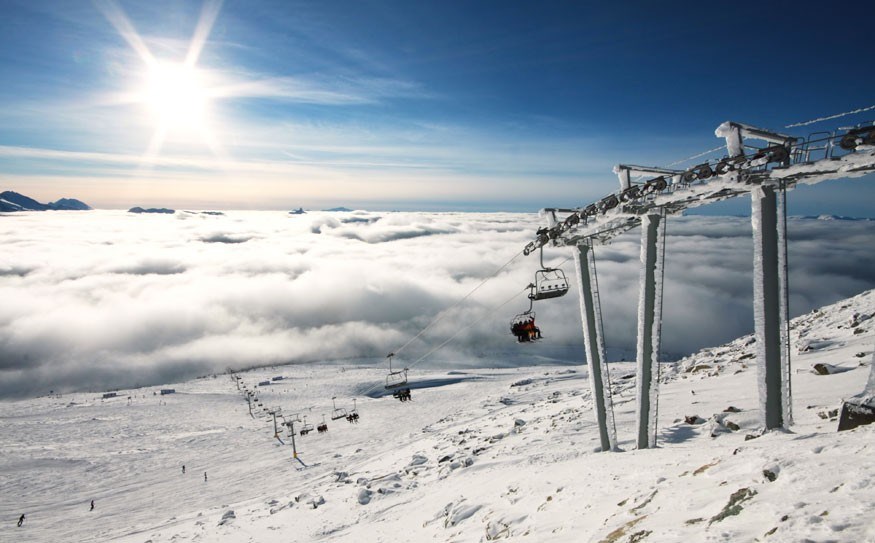British Columbians celebrate their first Family Day next weekend with a day off on Monday, Feb. 11. The long weekend holds a great deal of promise for Whistler Blackcomb and the 19 other B.C. ski areas — including Whistler Olympic Park and the cross-country trails at Lost Lake — that are offering B.C. residents half-price tickets on Family Day.
Indeed, the holiday could almost be called Family Ski Day, the efforts of the ski industry being critical to the results of an online poll that asked British Columbians whether they preferred the second Monday or the third Monday in February for the holiday.
"The third Monday in February is a holiday in the USA and five Canadian provinces; thus, many BC Ski Resorts are already operating at full capacity on this weekend," said the Canada West Ski Areas Association in its lobbying efforts last spring. "Therefore, having BC Family Day on this day would diminish the potential for British Columbians to enjoy BC Ski Resorts and other tourism experiences throughout the province. Moreover, it would result in a significant lost economic opportunity for the province."
The expectation — buoyed by an ad campaign by CWSAA and Tourism BC and promising early bookings at many resorts — is that many B.C. residents will decide to go skiing on the new long weekend. That should benefit businesses throughout Whistler and other ski towns.
But as encouraging as the signs are for Family Day, and as healthy as Whistler Blackcomb appears to be, the ski business needs to rebuild. And half-price tickets for one day — even free tickets for Grade 4 and 5 students through the decade-and-a-half-old SnowPass program — are only a small part of the answer.
The U.S.-based National Ski Areas Association states one of its primary missions "...is to help resorts understand the implications of the significant demographic shifts that lie on the horizon. Simply put, as Baby Boomers — a generation that helped build the industry into what it is today — continue to age, they will begin dropping out of the sport at an alarming rate. Without an industry-wide effort focused on attracting newer, younger participants and converting them into loyal skiers and riders, ski areas could face dramatic declines in visitation in the not-so distant future."
The NSAA's Canadian counterpart, the Canadian Ski Council, acknowledged the importance of converting beginner skiers and boarders into devoted skiers and boarders in a 2011 report titled Running to Stand Still; Why Growing the Sport Matters Now More than Ever.
"The national beginner conversion rate now stands at 18.4 percent, up only 1.4 percentage points from the 2001/02 season, and well short of the 25 percent goal for the industry. And while some have observed the Canadian rate is significantly higher than the U.S.'s beginner conversion rate of 16.7 percent, others would consider that cold comfort given declines in overall snowsports participation in Canada."
The NSAA produced its own report last fall, which stated in part: "As an industry, we convert only about 15 percent (sic) of first-timers into long-term participants." Improving the quality of ski area operations helps but, "If they can add to these efforts, a renewed focused commitment to growing their first-time skiers and snowboarders by 6 percent annually and gradually improving the conversion rate from 15 percent to 25 percent, the industry can accomplish the overall turnaround that is badly needed."
The NSAA notes that many ski areas (including those in Canada) have taken measures to improve the beginner skier and boarder's experience, including state of the art learning centres, ticket-lesson-and-equipment deals, employee incentives and better equipment to learn on. This has helped boost the number of first-timers to snowsports, particularly in resorts near urban areas. But, "while these tangible efforts are encouraging, conversion... has emerged as the predominant roadblock in the industry's ultimate goal of growing the sport by 10 percent. The intangible 'psychology of conversion' and the 'golden hour' between trial and conversion must be more effectively addressed."
The importance of converting beginners is reflected in the fact that the Canadian ski industry has "seen international visits decline by over half what they used to be in 2001/02, and domestic visitation has shown anemic growth built not on increased participation, but on increases in average days skied/snowboarded."
The Canadian Ski Council estimates there were about 2.3 million "active" skiers and snowboarders in Canada in 2010/11. While that number goes up and down each season the 10-year trend shows "an erosion in our active participant base." As well, the average number of days an "active" Canadian skied or snowboarded peaked in 2007/08 at 8.3. It declined steadily to 7.1 days by 2010/11.
"These two data points have frightening implications," said the CSC. "We have a gradually declining number of active participants skiing and riding fewer days per season."
Like the NSAA, the CSC concludes converting beginners into lifetime devotees is critical but notes: "Everything is interconnected. Conversion impacts not just the beginner skier and rider but everyone in their travel party." If a child, an adult, a girlfriend or boyfriend has a bad experience as a beginner it will influence the family or friend's decision to return to the sport.
So happy Family Ski Day. Let's hope it leads to more than just one day on the slopes.




